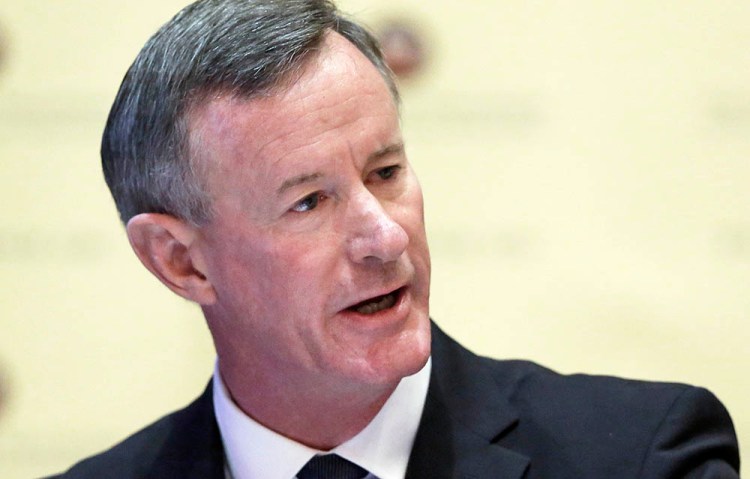William McRaven, a retired four-star admiral and former Navy SEAL, defended journalists this week, calling President Donald Trump’s denunciation of the media as “the enemy of the American people” the “greatest threat to democracy” he’s seen in his lifetime.
That’s coming from a man who’s seen major threats to democracy.
McRaven, who was commander of the secretive Joint Special Operations before he retired from the military, is the man who organized and oversaw the highly risky operation that killed Osama bin Laden almost six years ago. The admiral from Texas had tapped a special unit of Navy SEALs to carry out the May 2011 raid of the elusive terrorist’s hideout, a high-walled compound in Abbottabad, Pakistan, The Washington Post reported shortly after bin Laden’s death.
McRaven left the military in 2014 after nearly four decades and later became chancellor of the University of Texas System. The UT-Austin alumnus, who has a bachelor’s degree in journalism, addressed a crowd at the university’s college of communication on Tuesday.
“We must challenge this statement and this sentiment that the news media is the enemy of the American people,” McRaven said, according to the Daily Texan. “This sentiment may be the greatest threat to democracy in my lifetime.”
“To be a good leader you have to be a good communicator,” he added. “As a leader you have to communicate your intent every chance you get and if you fail to do that, you will pay the consequences.”
McRaven’s remarks come amid Twitter attacks on the media by the president, who’s hollered “FAKE NEWS” at several negative stories about his administration. In a widely shared tweet Friday, Trump called the media, naming The New York Times, NBC, ABC, CBS and CNN, “the enemy of the American People!”
In another tweet the same day, Trump quoted conservative talk radio host Rush Limbaugh, who praised the president’s news conference the day before during which he confronted the media.
“One of the most effective press conferences I’ve ever seen!” says Rush Limbaugh. Many agree. Yet FAKE MEDIA calls it differently! Dishonest,” Trump tweeted.
Trump repeatedly blasted the media in a combative, more-than-an-hour-long news conference last Thursday, repeating descriptions of the press as dishonest and fake.
He berated a Jewish reporter for asking a question about bomb threats to dozens of Jewish community centers and for expressing concerns that Trump had yet to address anti-Semitic attacks. The president took the question as a personal affront, saying he was not anti-Semitic, even though the reporter never made such an accusation.
At the news conference, the president also criticized the intelligence community, asserted that his young administration is running smoothly and said that he’d “inherited a mess.”
Trump has lashed out at the media a couple more times on Twitter over the past few days.
McRaven is not the only retired military man who has criticized the president’s remarks.
In an interview Saturday on NBC News, Sen. John McCain, R-Ariz., a vocal Trump critic, said such criticisms of the media is “how dictators get started.”
“In other words, a consolidation of power,” McCain told “Meet the Press” host Chuck Todd from Munich. “When you look at history, the first thing that dictators do is shut down the press. And I’m not saying that President Trump is trying to be a dictator. I’m just saying we need to learn the lessons of history.”
McCain was specifically responding to Trump’s condemnation of the news media as the enemy of the people, a phrase “typically used by leaders to refer to hostile foreign governments or subversive organization” and “echoed the language of autocrats who seek minimize dissent,” the New York Times wrote.
This is not the only time McRaven has spoken out since leaving the military.
In a seething column published last year in the Tampa Tribune, he blasted Congress, specifically the Senate, for a “disturbing trend in how politicians abuse and denigrate military leadership, particularly the officer corps, to advance their political agendas.”
McRaven was particularly angry at the Senate’s treatment of Rear Adm. Brian Losey, who was forced to retire after several Democratic and Republican senators pressured the Navy to hold him accountable for retaliating against multiple whistleblowers, The Post’s Craig Whitlock wrote in 2016.
“A series of DOD inspector general investigations were reviewed by the Navy leadership and, once again, Adm. Losey was found not to have violated the law, rule or policy. In fact, it was clear to the Navy that the personnel action taken by Losey against the complainants was not reprisal,” McRaven wrote, adding later: “Despite the Navy’s multiple endorsements, certain members of Congress chose to use Losey’s case to pursue their own political agenda. They held hostage other Navy nominations until Losey’s promotion recommendation was rescinded. The ransom for their congressional support was Brian Losey’s career and, more importantly, his stellar reputation.”
Losey, who was commander in charge of the Navy’s elite SEAL teams, served under McRaven.
McRaven, one of the most experienced terrorist hunters in the U.S. government, had spent years tracking bin Laden and recruited the Navy SEALs that carried out the raid two months before the terrorist was killed, Whitlock wrote.
The search for bin Laden was led by the CIA. Leon Panetta, the agency’s director at the time, delegated the mission to McRaven after then-President Barack Obama gave the authorization.
In his book titled “Spec Ops,” McRaven noted six key requirements for any successful mission: surprise, speed, security, simplicity, purpose and repetition.
The Washington Post’s Amy B Wang contributed to this story.
Send questions/comments to the editors.


